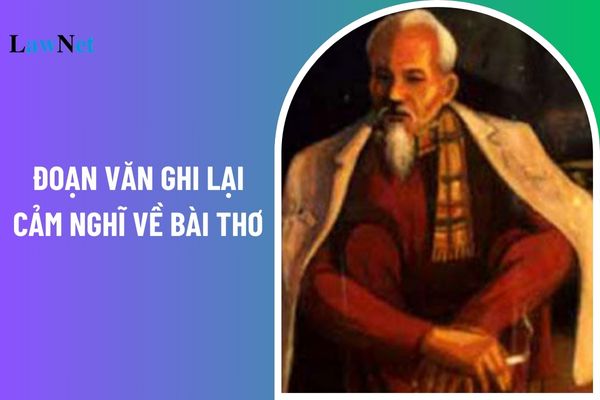What are the 03 sample paragraphs expressing feelings and emotions about the poem "Đêm nay Bác không ngủ"? What 03 contents does the text corpus used in the 6th-grade Literature curriculum in Vietnam include?
What are the 03 sample paragraphs expressing feelings and emotions about the poem "Đêm nay Bác không ngủ"?
Below are 03 sample paragraphs expressing feelings and emotions about the poem "Đêm nay Bác không ngủ":
Sample 1: Uncle Ho's Deep Affection for the People
The poem "Đêm nay Bác không ngủ" by Minh Hue realistically depicts the image of Uncle Ho during a cold night alongside the soldiers. Through each verse, Uncle Ho emerges with a contemplative demeanor, concerned for the soldiers and the people. He does not sleep, not because of insomnia, but because of his immense love for the people and the soldiers. His silent sacrifices evoke admiration and emotion. The poem not only praises the great Uncle Ho but also evokes deep reverence and gratitude towards the beloved father of the nation.
Sample 2: The Image of Uncle Ho - Simple yet Great
Through the poem "Đêm nay Bác không ngủ", we sense a close and simple yet immensely great Uncle Ho. Although the leader of an entire nation, he still worries about each soldier and each citizen. Amidst the cold night, he sits by the fire, gently covering soldiers with blankets, silently contemplating the country's fate. Uncle Ho's sacrifices move the soldiers and deeply stir the hearts of readers. Minh Hue used simple yet earnest verses to carve the image of Uncle Ho—a leader of the people, always concerned for the country and its citizens.
Sample 3: Uncle Ho's Immense Love
The poem "Đêm nay Bác không ngủ" vividly captures Uncle Ho's vast love for the soldiers and the people. Among the desolate woods, He is sleepless, His eyes shining in the night. He worries about the soldiers being cold and the people still suffering. Uncle Ho's entire life was dedicated without a moment of selfish thoughts. Reading the poem, we respect and take pride in the great leader of the nation. Simple yet emotion-filled verses deeply engrave Uncle Ho's image in the reader's hearts, reminding today's generation to live worthy of the sacrifices made by our forefathers.
Sample 4: Uncle Ho Staying Awake All Night for the People and the Nation
The poem "Đêm nay Bác không ngủ" leaves readers with a powerful image of Uncle Ho. Under the cold nighttime, Uncle Ho silently stays awake, not for himself but out of concern for the soldiers and the nation. His reflective demeanor, His contemplative eyes, every gesture caring for the soldiers reflects immense love. He never shied away from hardship, sacrifice, only wishing soldiers a good night’s sleep and the people swift peace. Minh Hue's poem beautifully portrays a majestic yet immensely close figure, stirring feelings of profound admiration and gratitude towards Uncle Ho in every reader.
Sample 5: Uncle Ho's Great Heart for the Soldiers
The poem "Đêm nay Bác không ngủ" vividly portrays a simple yet noble image of President Ho Chi Minh. Late at night, while everyone has fallen asleep, He still sits by the fire, tending to each soldier's sleep. He cannot sleep because his mind is filled with concerns: the resistance, the soldiers enduring hardship under open skies. Uncle Ho's love is immense and great but shown through very simple actions. Reading the poem, we cannot help but feel moved and grow to love Uncle Ho even more—a leader devoted his life to the nation and its people.
Sample 6: Affection and Respect for Uncle Ho
Through the poem "Đêm nay Bác không ngủ", the image of Uncle Ho emerges as sacred and noble. Under the chilly forest rain, He remains there, restless for the soldiers and the country. Gently covering soldiers with blankets, His eyes filled with love. Uncle Ho’s silent sacrifices not only moved soldiers but also touched the reader's hearts. He dedicated his entire life to the nation, to the resistance, never thinking about himself. Minh Hue’s poem stirs within us deep respect and affection for Uncle Ho and reminds future generations to cherish and uphold the values He cultivated.
Note: These 03 sample paragraphs are for reference purposes only!

What are the 03 sample paragraphs expressing feelings and emotions about the poem "Đêm nay Bác không ngủ"? What 03 contents does the text corpus used in the 6th-grade Literature curriculum in Vietnam include?
What 03 contents does the text corpus used in the 6th-grade Literature curriculum in Vietnam include?
According to the General Education Program for Literature issued with Circular 32/2018/TT-BGDDT, the text corpus used in the 6th-grade Literature curriculum in Vietnam includes:
Literary Texts
- Legends, folktales, fables, short stories
- Poetry, six-eight-verse poetry
- Memoirs or travelogues
Argumentative Texts
- Social argumentation
- Literary argumentation
Informational Texts
- Narratives of an event
- Meeting notes
- Summary diagrams
What are the objectives of the 6th-grade Literature curriculum in Vietnam?
According to the General Education Program for Literature issued with Circular 32/2018/TT-BGDDT, the objectives of the 6th-grade Literature curriculum in Vietnam are as follows:
- To help students continue to develop good traits formed in primary education; enhance and broaden the development of traits with specific expressions such as pride in national and literary history; dreams and aspirations, self-learning and self-esteem, civic awareness, law respect.
- To continue developing common capacities, language proficiency, and adaptation capacity.

